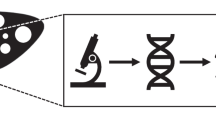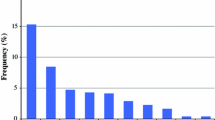Abstract
Background
The results reported in the TOPAZ-1 phase III trial led to the approval of the combination of cisplatin and gemcitabine with durvalumab as the new first-line standard of care for patients with locally advanced or metastatic cholangiocarcinoma.
Objective
We performed a clustering analysis to classify patients into different groups based on their mutation profile, correlating the results of the analysis with clinical outcomes.
Methods
We selected 51 patients with cholangiocarcinoma who were treated with the combination of chemotherapy and durvalumab and who were screened using the next-generation sequencing-based FoundationOne gene panel. We conducted mutation-based clustering of tumors and a survival analysis.
Results
Three main clusters were identified. Cluster 1 is mostly characterized by mutations in genes belonging to the chromatin modification pathway, altered in 100% of patients. Cluster 2 is characterized by the alteration of several pathways, among which DNA damage control, chromatin modification, RTK/RAS, cell-cycle apoptosis, TP53, and PI3K were the most affected. Finally, most altered pathways in cluster 3 were RTK/RAS and cell-cycle apoptosis. Overall response rate was 4/13 (31%), 12/24 (50%), and 0/10 (0%) in cluster 1, cluster 2, and cluster 3, respectively, and the difference between the three clusters was statistically significant (p = 0.0188).
Conclusions
By grouping patients into three clusters with distinct molecular and genomic alterations, our analysis showed that patients included in cluster 2 had higher overall response rates, whereas patients included in cluster 3 had no objective response. Further investigations on larger and external cohorts are needed in order to validate our results.




Similar content being viewed by others
References
Rimini M, Puzzoni M, Pedica F, Silvestris N, Fornaro L, Aprile G, et al. Cholangiocarcinoma: new perspectives for new horizons. Expert Rev Gastroenterol Hepatol. 2021;15(12):1367–83. https://doi.org/10.1080/17474124.2021.1991313.
Wu J, Yang S, Xu K, Ding C, Zhou Y, Fu X, et al. Patterns and trends of liver cancer incidence rates in Eastern and Southeastern Asian countries (1983–2007) and predictions to 2030. Gastroenterology. 2018;154(6):1719-28.e5. https://doi.org/10.1053/j.gastro.2018.01.033.
Bertuccio P, Malvezzi M, Carioli G, Hashim D, Boffetta P, El-Serag HB, et al. Global trends in mortality from intrahepatic and extrahepatic cholangiocarcinoma. J Hepatol. 2019;71(1):104–14. https://doi.org/10.1016/j.jhep.2019.03.013.
Sia D, Villanueva A, Friedman SL, Llovet JM. Liver cancer cell of origin, molecular class, and effects on patient prognosis. Gastroenterology. 2017;152:745–61.
Mazzaferro V, Gorgen A, Roayaie S, DrozDitBusset M, Sapisochin G. Liver resection and transplantation for intrahepatic cholangiocarcinoma. J Hepatol. 2020;72(2):364–77. https://doi.org/10.1016/j.jhep.2019.11.020.
Valle J, Wasan H, Palmer DH, Cunningham D, Anthoney A, Maraveyas A, et al. Cisplatin plus gemcitabine versus gemcitabine for biliary tract cancer. N Engl J Med. 2010;362(14):1273–81. https://doi.org/10.1056/NEJMoa0908721.
Vogel A, Bridgewater J, Edeline J, Kelley RK, Klümpen HJ, Malka D, ESMO Guidelines Committee, et al. Biliary tract cancer: ESMO clinical practice guideline for diagnosis, treatment and follow-up. Ann Oncol. 2023;34(2):127–40. https://doi.org/10.1016/j.annonc.2022.10.506.
Lamarca A, Kapacee Z, Breeze M, Bell C, Belcher D, Staiger H, et al. Molecular profiling in daily clinical practice: practicalities in advanced cholangiocarcinoma and other biliary tract cancers. J Clin Med. 2020;9(9):2854. https://doi.org/10.3390/jcm9092854.
Rimini M, Loi E, Fabregat-Franco C, Burgio V, Lonardi S, Niger M, et al. Next-generation sequencing analysis of cholangiocarcinoma identifies distinct IDH1-mutated clusters. Eur J Cancer. 2022;175:299–310. https://doi.org/10.1016/j.ejca.2022.08.026.
Rimini M, Fabregat-Franco C, Burgio V, Lonardi S, Niger M, Scartozzi M, et al. Molecular profile and its clinical impact of IDH1 mutated versus IDH1 wild type intrahepatic cholangiocarcinoma. Sci Rep. 2022;12(1):18775. https://doi.org/10.1038/s41598-022-22543-z.
Rimini M, Macarulla T, Burgio V, Lonardi S, Niger M, Scartozzi M, et al. Gene mutational profile of BRCAness and clinical implication in predicting response to platinum-based chemotherapy in patients with intrahepatic cholangiocarcinoma. Eur J Cancer. 2022;171:232–41. https://doi.org/10.1016/j.ejca.2022.05.004.
Nakamura H, Arai Y, Totoki Y, Shirota T, Elzawahry A, Kato M, et al. Genomic spectra of biliary tract cancer. Nat Genet. 2015;47(9):1003–10. https://doi.org/10.1038/ng.3375.
Oh DY, He AR, Qin S, Chen LT, Okusaka T, Vogel A, et al. A phase 3 randomized, double-blind, placebo-controlled study of durvalumab in combination with gemcitabine plus cisplatin (GemCis) in patients (pts) with advanced biliary tract cancer (BTC): TOPAZ-1. NEJM Evid. 2022. https://doi.org/10.1056/EVIDoa2200015.
Valle JW, Qin S, Antonuzzo L, Tougeron D, Lee C, et al. Impact of mutation status on efficacy outcomes in TOPAZ-1: A phase III study of durvalumab (D) or placebo (PBO) plus gemcitabine and cisplatin (+GC) in advanced biliary tract cancer (BTC). Ann Oncol. 2022;33(Suppl_9):S1454–84. https://doi.org/10.1016/annonc/annonc1123.
Kelley RK, Ueno M, Yoo C, Finn RS, Furuse J, Ren Z, et al. Pembrolizumab in combination with gemcitabine and cisplatin compared with gemcitabine and cisplatin alone for patients with advanced biliary tract cancer (KEYNOTE-966): a randomised, double-blind, placebo-controlled, phase 3 trial. Lancet. 2023;S0140–6736(23):00727–34. https://doi.org/10.1016/S0140-6736(23)00727-4.
Zhang W, Flemington EK, Zhang K. Driver gene mutations based clustering of tumors: methods and applications. Bioinformatics. 2018;34(13):i404–11. https://doi.org/10.1093/bioinformatics/bty232.
Vogelstein B, Papadopoulos N, Velculescu VE, Zhou S, Diaz LA Jr, Kinzler KW. Cancer genome landscapes. Science. 2013;339(6127):1546–58. https://doi.org/10.1126/science.1235122.
Sanchez-Vega F, Mina M, Armenia J, Chatila WK, Luna A, La KC, et al. Oncogenic signaling pathways in The Cancer Genome Atlas. Cell. 2018;173(2):321-37.e10. https://doi.org/10.1016/j.cell.2018.03.035.
Shroff RT, Guthrie KA, Scott AJ, et al. SWOG 1815: a phase III randomized trial of gemcitabine, cisplatin, and nab-paclitaxel versus gemcitabine and cisplatin in newly diagnosed, advanced biliary tract cancers. J Clin Oncol. 2023;41(Suppl 4):LBA490. https://doi.org/10.1200/JCO.2023.41.3_suppl.LBA490.
Watkins JA, Irshad S, Grigoriadis A, Tutt AN. Genomic scars as biomarkers of homologous recombination deficiency and drug response in breast and ovarian cancers. Breast Cancer Res. 2014;16:211.
Turner N, Tutt A, Ashworth A. Hallmarks of ‘BRCAness’ in sporadic cancers. Nat Rev Canc. 2004;4:814e9.
Muggia F, Safra T. ‘BRCAness’ and its implications for platinum action in gynecologic cancer. Anticancer Res. 2014;34:551–6.
Bryant HE, Schultz N, Thomas HD, Parker KM, Flower D, Lopez E, et al. Specific killing of BRCA2-deficient tumours with inhibitors of poly(ADP-ribose) polymerase. Nature. 2005;434(7035):913–7. https://doi.org/10.1038/nature03443.
Wattenberg MM, Asch D, Yu S, O’Dwyer PJ, Domchek SM, Nathanson KL, et al. Platinum response characteristics of patients with pancreatic ductal adenocarcinoma and a germline BRCA1, BRCA2 or PALB2 mutation. Br J Cancer. 2020;122(3):333–9. https://doi.org/10.1038/s41416-019-0582-7.
Golan T, Hammel P, Reni M, Van Cutsem E, Macarulla T, Hall MJ, et al. Maintenance olaparib for germline BRCA-mutated metastatic pancreatic cancer. N Engl J Med. 2019;381(4):317–27. https://doi.org/10.1056/NEJMoa1903387.
O’Connor MJ. Targeting the DNA damage response in cancer. Mol Cell. 2015;60(4):547–60. https://doi.org/10.1016/j.molcel.2015.10.040.
Chatzinikolaou G, Karakasilioti I, Garinis GA. DNA damage and innate immunity: links and trade-offs. Trends Immunol. 2014;35(9):429–35. https://doi.org/10.1016/j.it.2014.06.003.
Mouw KW, Goldberg MS, Konstantinopoulos PA, D’Andrea AD. DNA damage and repair biomarkers of immunotherapy response. Cancer Discov. 2017;7(7):675–93. https://doi.org/10.1158/2159-8290.CD-17-0226.
Nastasi C, Mannarino L, D’Incalci M. DNA damage response and immune defense. Int J Mol Sci. 2020;21(20):7504. https://doi.org/10.3390/ijms21207504.
Galon J, Costes A, Sanchez-Cabo F, Kirilovsky A, Mlecnik B, Lagorce-Pagès C, et al. Type, density, and location of immune cells within human colorectal tumors predict clinical outcome. Science. 2006;313(5795):1960–4. https://doi.org/10.1126/science.1129139.
Author information
Authors and Affiliations
Corresponding author
Ethics declarations
Funding
No external funding was used in the preparation of this article.
Conflict of Interest/Competing Interests
Monica Niger received travel expenses from AstraZeneca, speaker honoraria from Accademia della Medicina and Incyte; honoraria from Sandoz, Medpoint SRL, Incyte, and Servier for editorial collaboration; and consultant honoraria from EMD Serono, Basilea Pharmaceutica, Incyte, MSD Italia, Servier, Astrazeneca, and Taiho. TP: Swedish Orpahn Biovitrum AB, Ability Pharmaceuticals SL, Aptitude Health, AstraZeneca, Basilea Pharma, Baxter, BioLineRX Ltd, Celgene, Eisai, Ellipses, Genzyme, Got It Consulting SL, Hirslanden/GITZ, Imedex, Incyte, Ipsen Bioscience , Inc, Janssen, Lilly. Marketing Farmacéutico & Investigación Clínica, S.L, MDS, Medscape, Novocure, Paraxel, PPD Development, Polaris, QED Therapeutics, Roche Farma, Sanofi-Aventis, Servier, Scilink Comunicación Científica SC, Surface Oncology, and Zymeworks. Tiziana Pressiani received/reports consulting fees from Bayer, Ipsen, and Astra Zeneca; institutional research funding from Roche, Bayer, and Astra Zeneca; and travel accommodations from Roche. Lorenza Rimassa declares consulting/advisory roles for AstraZeneca, Basilea, Bayer, BMS, Eisai, Exelixis, Genenta, Hengrui, Incyte, Ipsen, IQVIA, Jazz Pharmaceuticals, MSD, Nerviano Medical Sciences, Roche, Servier, Taiho Oncology, Zymeworks; honoraria for lectures from AstraZeneca, Bayer, BMS, Eisai, Incyte, Ipsen, Merck Serono, Roche, and Servier; travel expenses from AstraZeneca; and research funding (to institution) from Agios, AstraZeneca, BeiGene, Eisai, Exelixis, Fibrogen, Incyte, Ipsen, Lilly, MSD, Nerviano Medical Sciences, Roche, and Zymeworks. Sara Lonardi reports research funding (to institution) from Amgen, Astellas, Astra Zeneca, Bayer, Bristol-Myers Squibb, Daichii Sankyo, Hutchinson, Incyte, Merck Serono, Mirati, MSD, Pfizer, Roche, and Servier; personal honoraria as an invited speaker from Amgen, Bristol-Myers Squibb, Incyte, GSK, Lilly, Merck Serono, MSD, Pierre-Fabre, Roche, and Servier; and participation in advisory boards for Amgen, Astellas, Astra Zeneca, Bayer, Bristol-Myers Squibb, Daiichi-Sankyo, GSK, Incyte, Lilly, Merck Serono, MSD, Servier, and Takeda. Lorenzo Fornaro reports personal honoraria as an invited speaker from Incyte, Bristol Myers Squibb and Lilly; research funding (to institution) from MSD, Bristol Myers Squibb, AstraZeneca, Incyte, BeiGene, Astellas, Daiichi Sankyo, and Roche; and participation in advisory boards for MSD, AstraZeneca, Incyte, Taiho, Servier, Daiichi Sankyo, and Lilly. Margherita Rimini, Eleonora Loi, Mario Domenico Rizzato, Caterina Vivaldi, Eleonora Gusmaroli, Lorenzo Antonuzzo, Erika Martinelli, Ingrid Garajova, Guido Giordano, Jessica Lucchetti, Marta Schirripa, Noemi Cornara, Federico Rossari, Francesco Vitiello, Elisabeth Amadeo, Mara Persano, Vittoria Matilde Piva, Rita Balsano, Francesca Salani, Chiara Pircher, Stefano Cascinu, Mario Scartozzi, Patrizia Zavattari, Andrea Casadei-Gardini have no conflicts of interest that are directly relevant to the content of this article.
Ethics Approval
The ethics review board of each institutional hospital approved the present study. This study was performed in line with the principles of the Declaration of Helsinki.
Consent to Participate
Written informed consent for treatment was obtained for all patients.
Consent for Publication
Not applicable.
Availability of Data and Material
Data are available on request from the authors.
Code Availability
Not applicable.
Authors’ Contributions
Conception and design: EL, MR, PZ, AC-G; acquisition of data (acquired and managed patients): all authors. analysis and interpretation of data: EL, MR, PZi, AC-G; writing, review, and/or revision of the manuscript: EL, MR, PZ, AC-G; final approval of manuscript: all authors.
Supplementary Information
Below is the link to the electronic supplementary material.
Rights and permissions
Springer Nature or its licensor (e.g. a society or other partner) holds exclusive rights to this article under a publishing agreement with the author(s) or other rightsholder(s); author self-archiving of the accepted manuscript version of this article is solely governed by the terms of such publishing agreement and applicable law.
About this article
Cite this article
Rimini, M., Loi, E., Rizzato, M.D. et al. Different Genomic Clusters Impact on Responses in Advanced Biliary Tract Cancer Treated with Cisplatin Plus Gemcitabine Plus Durvalumab. Targ Oncol 19, 223–235 (2024). https://doi.org/10.1007/s11523-024-01032-5
Accepted:
Published:
Issue Date:
DOI: https://doi.org/10.1007/s11523-024-01032-5




